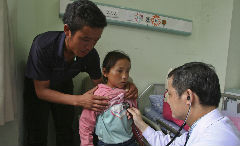Relocated families get more than a stable life
2018-09-12
cgtn.com
Ngari Prefecture in western Tibet is trying every means to lift thousands of people out of poverty. One key solution is to move those living in very harsh conditions and give them a new home. But a much more important question is – how they can sustain their livelihoods after relocation. CGTN’s Zheng Quanbin visited one relocated community to find out.
This newly built residential community lies in Gar county, capital of Ngari prefecture. It’s a place now three thousand people call home.
Tseten and his daughter’s family moved into this apartment about a year ago. He used to live in a remote high-altitude area known for pasturing, and life was not easy.
“The conditions there were very rough. We didn’t even have toilets, and it was hard to support the family because we only raised a very small herd of cattle and goats,” Tseten said.
Even so, Tseten hesitated about moving, as he was not sure what a new life would look like. But now, he says he’s beginning to love it.
“All the furniture and home appliances like the television are ready to use. I was worried, but now there is nothing to worry about.”
Tseten is not working now, but he could if he wished to. The local government has sponsored a factory that produces both garments and carpets, making good use of locally produced wool. The factory now provides more than 100 jobs and the number is growing.
The factory makes an annual profit of 1.6 million yuan. Part of the profit will be given to the relocated families, including Tseten’s.
Tseten’s two granddaughters are attending this kindergarten, close to their new home. With millions of yuan invested by the government, all the kids among the relocated families are receiving education here for free.
This community is one of the 30 residential areas designated for relocation in Ngari. Officials say five thousand people who lived in harsh conditions have moved into these areas. Another three thousand are still in need of help.
“Some of them are hesitant about moving. We respect their decisions, but still we hope to let them know what their life will look like after being relocated. We will also try to create more jobs for them if they wish to move out of those harsh areas,” said Dawa Phuntsok, director of anti-poverty office of Ngari prefecture.
For Tseten, moving to town is a big change to his way of life, but he says it’s a change for the better, both for himself and the younger generations.



